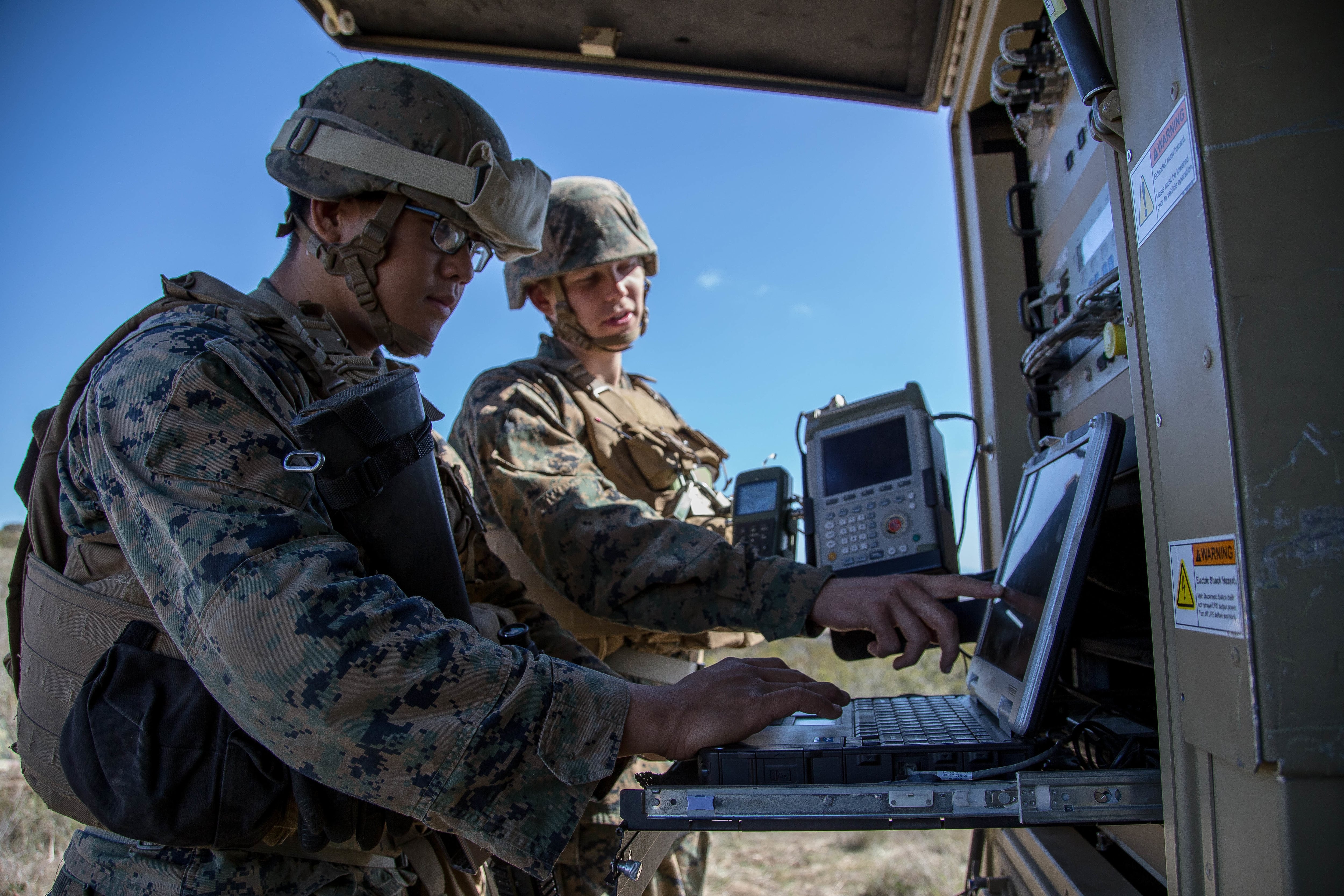The tip of the spear is not just for grunts anymore.
The Marine Corps’ is setting in motion plans to push Marines trained in cyber operations and electronic warfare into forward-deployed combat units.
For example, sitting on the commandant’s desk awaiting his signature is a plan to alter the traditional 13-man rifle squad by adding a Marine proficient in drone operations and electronic warfare.
In a sign that the Corps is looking to uphold its tradition of “Every Marine a Rifleman” in the era of cyber operations, officials in March issued a statement to shut down a proposal that sought to allow civilians with vital cyber skills to bypass boot camp or The Basic School for officers.
RELATED

The Marine Corps recently created a cyber career field for the first time.
And the Corps is quickly ramping up its efforts to integrate cyber operations at the tactical level. For the first time last year, the Marine Forces Cyber supported a training exercise in each Marine Expeditionary Force.
Collectively, Marine Corps’ changes in recent months are pushing back on the public’s general perception of cyber and intel operators as Mountain Dew drinking basement dwellers who operate far from the front and separately from the Corps combat units.
“Everyone has this picture in their mind of the pudgy overweight kid sitting on the couch in the dark of the night hacking into someone’s system — that’s not accurate,” said Dakota Wood, a retired Marine officer and researcher at the Heritage Foundation.
“You can actually achieve physical effects via cyberattack,” Wood said.
Eventually the Corps will see cyber and electronic warfare on equal par with combat arms.
“I think we are almost there right now,” he said.
As the Corps prepares for the prospect of facing down rising near-peer rivals like Russia and China, the Marines are prioritizing the recruitment and retention of top talent in fields like cyber, electronic warfare and Marines with coding and computer skill sets.
It’s a change that could have profound impacts across the Corps culturally and operationally. It may change the shape of the Corps and result in a top-heavy force of senior enlisted and warrant officers who undergo extensive — and costly — training. The Corps will not want to let those Marines leave after a single enlistment, as many grunts have historically done.
But finding and keeping those Marines will be a challenge as those same skills will be in top demand from high-paying civilian employers.
Yet top leaders in the Marine Corps and across the Defense Department believe a key factor to recruit and retain a growing cyber force is offering those unique cyber-trained experts an opportunity to work on missions unlike any found outside the military.
Cyberspace is an active war zone that requires adept operators capable of both cerebral stamina but also physical endurance to handle future front-line operations alongside infantry and special operators to carry out disinformation campaigns, destructive operations, aid battalion landing teams storming a beach, or hunt down high-value targets in dense urban megacities.
It’s a realization by top Marine officials that a future Marine force will need to be more tech savvy and skilled in intelligence collection, exploiting the electromagnetic spectrum, and operating in a hostile information environment if the Corps wants to compete with more sophisticated rivals.
COMPANY-LEVEL CYBER TEAMS
Though some military officials have told Marine Corps Times the Marine cyber force is not quite capable of leveraging cyber for infantry squad sized element, the military is certainly preparing for tactical level employment.
In the fall of 2015 the Army carried out a large-scale exercise involving the infantry, a Stryker brigade and the 201st Expeditionary Military Intelligence Brigade, and the 780th Military Intelligence Brigade at Joint Base Lewis-McChord, Washington.
The intent of the exercise was to demonstrate how offensive cyber operations at the tactical level could help grunts on the ground discriminate threats in a region and locate high-value targets.
And the Corps has been carrying out similar exercises, Marine officials told Marine Corps Times. The force is currently codifying cyberspace training scenarios across a range of tactical units to include aviation and ground pounders, and Marine cyber teams have been participating in joint training exercises, according to Capt. Christopher Harrison, a Marine spokesman.

Those cyber teams are already being pushed down all the way to the company level, Lt. Gen. Robert S. Walsh, the commanding general for Marine Corps Combat Development Command, testified before lawmakers in mid-March.
Cyber is not just an operator sitting in a room stateside trying to defend the network from hostile actors. There are numerous offensive capabilities.
Marines engaged in a future fight with China in the South China Sea could use cyberattacks to place disinformation in enemy ships or guidance systems. Attacks could be used to surveil or locate enemy forces.
A Marine landing force “might want to confuse the enemy for a period of time so that a ground maneuver element is able to successfully be completed,” Wood said.
With the proliferation of technology across the globe, even small ragtag militias, criminal gangs and terror groups have leveraged technology to carry out nefarious goals and objectives from illicit financing operations to propaganda.
But Marines operating in this new high-threat information environment will need to be able to exploit this information and data to gain tactical superiority on the battlefield. That will require EW operators and cyber specialists who can operate at the tactical level while surveilling the information environment to aid Marines in discriminating hostiles from civilians.
“You will see cyber operators right alongside air operations officers, logisticians, and artillery fires coordinators, it’s just going to be another component that a Marine Corps unit would have in the field,” he explained.
The new cyber field will help professionalize the cyber operators and build credibility within the Marine community.
RETENTION CHALLENGES
The Corps plans to grow by just over 1,000 Marines in the coming year, many of those new Marines will be cyber and intelligence operators.
“The Marine Corps Force 2025 changes some of the capability sets that we need and some of the skill sets we need,” Gen. Robert B. Neller, the commandant of the Marine Corps, told lawmakers in early March. “So those 1,000 people are already asked for in a number of different ways, whether they be cyber, more intel analysis, more security cooperation, ability people to do advisers and different people here and there, some are civilians.”
It’s a tall order for a Corps that hasn’t had a professional cyber occupational field until just a few weeks ago and recruitment pool where 90 percent of the American youth are uninterested in joining the military. Moreover, 60 percent of the Corps is under the age of 25, a push to recruit top educated talent will invariable lead to an older Corps with more senior enlisted and warrant officers, something the force has not seen in its history.

And to compound the issue, the training pipeline for a basic cyber operator whether defense or offense can take nearly three years.
A future cyber Marine will need to complete basic training, Marine Combat Training, then attend the six-month primary cyber school known as the Joint Cyber Analysis Course aboard Corry Station, Florida. Follow-on schools can take another six months and further on-the-job training required to certify future cyber specialists can take a year or more, military officials told Marine Corps Times.
“They’re going to be older. … It’s going to take longer to make these Marines.”
“I think it’s intuitive that the training pipeline and the availability to do that, it’s going to take you several years,” Neller said at a National Defense Industrial Association event in early March about the challenges in retaining and recruiting a cyber force. “You’re going to have to stay longer, I’m going to have to have some return on my investment.”
Also, not every cyber operator wants to sit behind a desk, especially when looking at a pool of applicants who are interested in a branch of service known for combat and physical prowess.
Lt. Gen. Rex C. McMillian, the commander of Marine Forces Reserves echoed some of those sentiments before lawmakers on Capitol Hill on March 6 during a readiness hearing.
The Corps has been trying to attract former Marines who’ve gone onto civilian cyber and tech school for the Reserves, a lot of those folks are interested in coming back into the Corps as cyber operators with the reserves but with one caveat: “that it’s attached to an operational unit, they’re not so interested in sitting in a command and control center — you know the hub of government — and watching threats come in, they want to be out on the pointy end of the spear so to speak,” McMillian said.
The Corps is considering plans to treat its cyber specialists much like they do with aviators. Pilots entering the Corps are required to serve a certain length of time, and that clock doesn’t start until the aviator finishes flight training.
The Marines may require cyber folks to serve for a certain period of time after completion of formal training, both Neller and Assistant Commandant Glenn M. Walters have hinted at.
But the Corps is pushing hard on cyber as it faces new global challenges and rising peers where a looming fight on the horizon will have Marines once again fighting “to get to the fight,” Neller often says.
The Corps is in the process of standing up two new cyber reserve companies on both coasts, the force has bolstered the new Marine Expeditionary Force Information Group, and Marine officials on Capitol Hill have sung praises about new initiatives to turn Marines into better thinkers with tools like 3-D printing.
The new 1700 occupational field has 1,100 billets for those Marines interested in defensive and offensive cyber operations. But, some roles will have a mix of contractor and civilian support. Across Marine Forces Cyberspace Command, or MARFORCYBER, including the Marine Corps Cyberspace Warfare Group and the Marine Corps Cyberspace Operations Group, there are 1,200 authorized bullets for Marines and civilians, according to Harrison.
And Neller has recently approved growing staff and command personnel at MARFORCYBER by roughly 500.
The Corps is amid a massive overhaul to retool a force that has been entrenched in counterinsurgency operations for the past 16 years. Marines have taken for granted operating in low-tech threat environments but in a future fight, the Corps is likely to be more disbursed with strained logistics trains, and the force will need personnel capable of battling in a multi domain battle space that includes the electromagnetic spectrum and problem solvers that can fix serious issues on the fly.
“As we grow the Marine Corps by another fourteen hundred Marines, we will enhance cyber information operations, special operations and intelligence, we must ensure steady and consistent funding to ensure we retain the highest quality, most technically-skilled Marines,” Lt. Gen. Brian D. Beaudreault, the deputy commandant Plans, Policies, and Operations, told lawmakers in early March.
Shawn Snow is the senior reporter for Marine Corps Times and a Marine Corps veteran.





